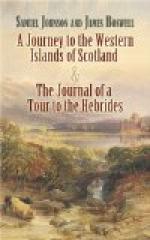The beasts of prey in the Islands are foxes, otters, and weasels. The foxes are bigger than those of England; but the otters exceed ours in a far greater proportion. I saw one at Armidel, of a size much beyond that which I supposed them ever to attain; and Mr. Maclean, the heir of Col, a man of middle stature, informed me that he once shot an otter, of which the tail reached the ground, when he held up the head to a level with his own. I expected the otter to have a foot particularly formed for the art of swimming; but upon examination, I did not find it differing much from that of a spaniel. As he preys in the sea, he does little visible mischief, and is killed only for his fur. White otters are sometimes seen.
In Raasay they might have hares and rabbits, for they have no foxes. Some depredations, such as were never made before, have caused a suspicion that a fox has been lately landed in the Island by spite or wantonness. This imaginary stranger has never yet been seen, and therefore, perhaps, the mischief was done by some other animal. It is not likely that a creature so ungentle, whose head could have been sold in Sky for a guinea, should be kept alive only to gratify the malice of sending him to prey upon a neighbour: and the passage from Sky is wider than a fox would venture to swim, unless he were chased by dogs into the sea, and perhaps than his strength would enable him to cross. How beasts of prey came into any islands is not easy to guess. In cold countries they take advantage of hard winters, and travel over the ice: but this is a very scanty solution; for they are found where they have no discoverable means of coming.
The corn of this island is but little. I saw the harvest of a small field. The women reaped the Corn, and the men bound up the sheaves. The strokes of the sickle were timed by the modulation of the harvest song, in which all their voices were united. They accompany in the Highlands every action, which can be done in equal time, with an appropriated strain, which has, they say, not much meaning; but its effects are regularity and cheerfulness. The ancient proceleusmatick song, by which the rowers of gallies were animated, may be supposed to have been of this kind. There is now an oar-song used by the Hebridians.
The ground of Raasay seems fitter for cattle than for corn, and of black cattle I suppose the number is very great. The Laird himself keeps a herd of four hundred, one hundred of which are annually sold. Of an extensive domain, which he holds in his own hands, he considers the sale of cattle as repaying him the rent, and supports the plenty of a very liberal table with the remaining product.




